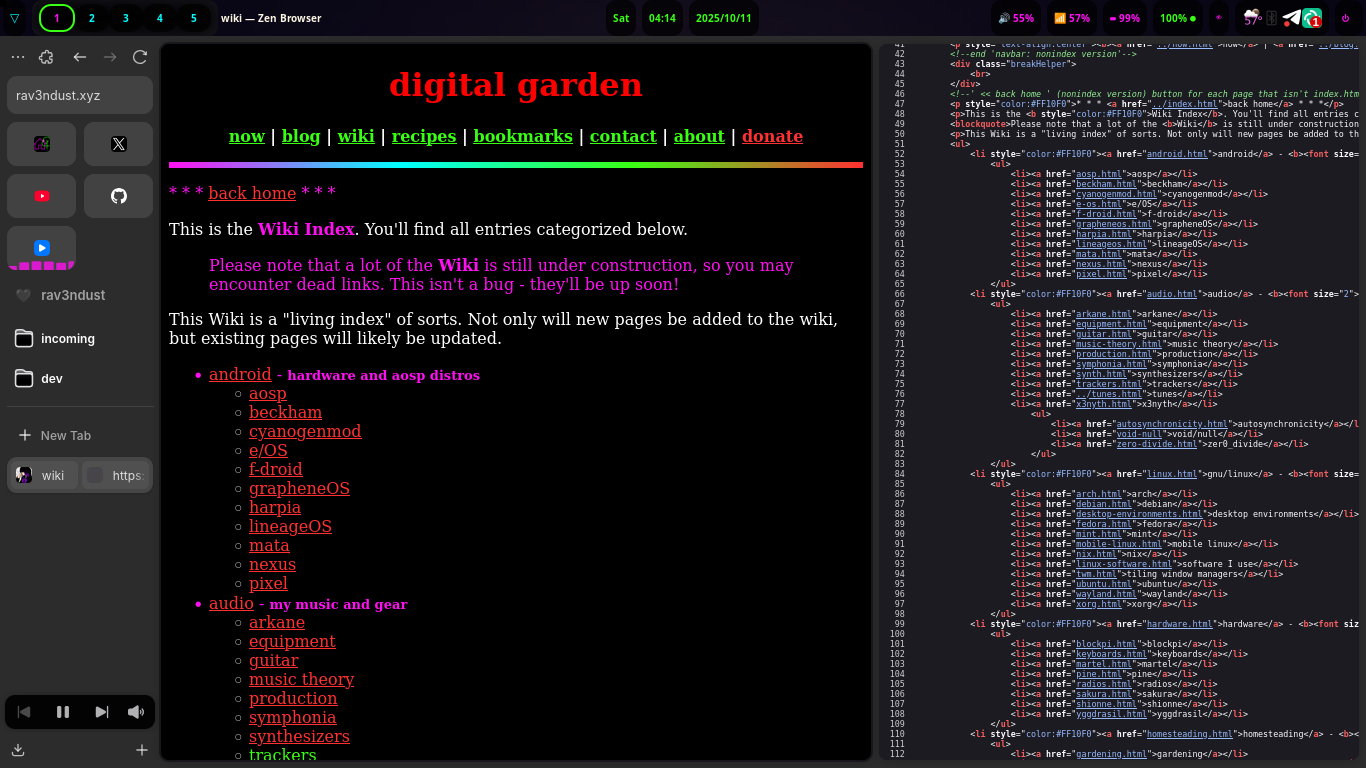now | blog | wiki | recipes | bookmarks | contact | about | donate
* * * back home * * *
helium + zen. cozy~
2025-10-11
Anyone who knows anything about me knows that I love the web. As an extension of this, I also greatly enjoy trying out new browsers as they make their way onto the scene. My main prerequisite for running any browser is knowing that it is free and open-source software, as it's a little hard for me to trust anything that isn't FOSS.
To that end, I wanted to discuss a couple of new browsers I've been running lately, on both the Chromium-base and Firefox-base side of things. These browsers are Helium and Zen, and they are both fantastic browsers that bring their own sets of strengths to the table, and set themselves apart a bit from the bases they're built on top of.
To that end, let's take a look at each one, what I like about them, and why I'd recommend them to others - are they cozy browsers that make your web browsing more comfortable and easy? I'd say the answer to both is yes. Let's see what is cool about each of them.

Helium is a newer browser that I have been using lately after seeing it discussed a good bit on social media and on Hacker News. It is built on top of Chromium, and brings in a very minimalist feel, along with a nice set of features in what looks like an unassuming browser.
Helium makes use of !bangs, meaning it is easy for you to search just about any search engine or major website you can imagine, by prefacing your platform of choice into the Omnibox as you get ready to search. For example, inside of Helium, if I want to search DuckDuckGo, I'd type !ddg followed by my search query. If I wanted to search for a GitHub repo, I'd type !github followed by my query, and so on and so forth. You can see how this would be quite powerful, as you usually have to pre-program these into your browser if you want to use them. It has over 13000 !bangs built in, so chances are high that whatever you're trying to search is already built in.
Helium also comes with Ublock Origin out of the box, allowing you to filter out ads and other bullshit right out of the gate. It incorporates flags from Ungoogled Chromium and extra Ublock filters to help increase privacy and remove some cruft from your web browsing experience. Being based on Chromium, it also has access to the Chrome Web Store for a wide range of extensions and themes for you to choose from.
Helium is built as a set of patches on Chromium and maintained by the good folks that also bring us Cobalt. If you want a nice, minimal Chromium-based browser that gets out of the way and has no BS built in, I recommend checking it out. It is in beta right now, and you can grab it as an AppImage for Linux.

The Zen browser is a fresh take on a Firefox base. It focuses on, well, zen, and making your browsing experience more chill. It has features such as split tabs, allowing you to move your tabs into tiles to see them side-by-side, a unified side-tab bar allowing you to handle all your tabbed browsing from the left or right side, and more.
Being based on Firefox, it has access to the full Mozilla Addons Store, and everything else you expect from the Gecko engine. Aside from the Mozilla storefront, it also has access to Zen Mods, which are community-made mods for the browser you can add on to make it more your own. For example, I've added on the "Transparent Zen" mod to mine, bringing in transparent elements to the browser, and the "Audio Indicator Enhanced" mod which allows you to make some changes to how the audio indication works.
Zen also brings in folders, which can be made to work in the same way as tab groups, if you choose. I keep folders for "Incoming", where I place tabs I want to read later that I find interesting, as well as "dev", which is where I keep work-related tabs. Zen also has "Spaces", which work like Workspaces, where you can separate your personal and work browsing, for example, if you choose.
You can pin tabs into your Essentials area, where they will show up as bigger tabs on your sidebar. Handy for keeping those tabs you use the most close at hand!
If you want to try out Zen on GNU/Linux, you can nab it from flathub.
Both of these browsers, built on different bases, Chromium and Firefox, bring something a little new to the table. Helium aims to be a minimal take on Chromium that keeps privacy and discoverability at the forefront, while Zen aims to be a new take on Firefox bringing an Arc-like experience to the Gecko platform. Both of them have found homes on my systems, and I plan on keeping them around for a long time to come.
Firefox Nightly and Brave Nightly still seem to be the main browsers I use every single day for years now, but I will always enjoy trying out new browsers, seeing what they're all about, and doing writeups on them, as someone will find their "browser home" in one of them. Web browsers are our portal to the internet, and our user-agent, and having a trustworthy, helpful, and let's face it, good-looking and "chill"-feeling browser is the best way to go to enjoy our experience surfing the web.